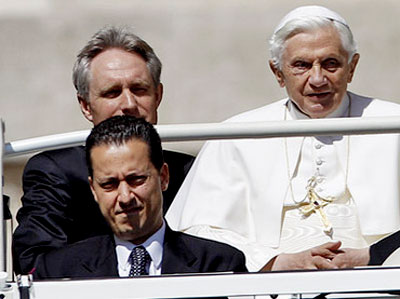|

26 May, 2012
from
RT Website

The Pope's
butler, Paolo Gabriele (bottom L) arrives with Pope Benedict XVI (R)
at St. Peter's Square
in Vatican, in this file photo taken May 23, 2012.
(Reuters / Alessandro
Bianchi / Files)
The identity of the man who leaked
dozens of confidential documents that have embarrassed the Vatican
in recent months appears to have been uncovered, after Pope
Benedict’s butler was arrested.
But
the Vatileaks scandal will not end
here.
A string of leaked letters exposing the Vatican from the inside has
dominated the headlines in Italy this year.
Now, Paolo Gabriele, a married layman who has personally
served the 85 year-old pontiff since 2006, has been detained and
placed in one of the Vatican’s own jail cells, after being caught
red-handed with "secret documents."
Gabriele was often seen at public functions by the side of the
increasingly frail Pope, helping him climb steps or shading him from
the sun.
Benedict XVI has released a
statement saying that he is "pained" by the betrayal.
The butler will likely go on trial in Italy, and may now face up to
20 years in prison for stealing correspondence from a head of state.
"Maria" may be
a man
Speculation immediately began in the local media that Gabriele is,
in fact, "Maria", the whistleblower who has been meeting with
prominent Italian journalist Gianluigi Nuzzi in a
now-notorious empty undercover apartment, passing on highly
confidential documents over the past year.
Nuzzi’s articles, and a scandalous
book published only last week, have
rocked the Vatican, painting the Holy See as a viper’s nest of
rivalries and corruption presided over by an ineffectual Pope unable
to discipline his charges.
Benedict
branded the book "criminal,"
and has promised to sue.
Many of the documents revealed by Nuzzi were letters addressed
directly to His Holiness, and being one of a handful of people who
have permanent access to the Pope’s quarters, Gabriele makes for a
plausible suspect.
But some believe "Maria" may be more than a single source.
"It doesn’t seem likely that he is
the only one responsible for Vatileaks because many of the
documents that came out didn’t ever pass through the pope’s
apartment where he works," opined Paolo Rodari, a Vatican expert
for Italian newspaper Il Foglio.
"His arrest seems more the Vatican’s
desire to find a scapegoat."
Then again, Gabriele might not be the
only whistleblower the Vatican has ousted.
Ettore Gotti Tedeschi,
the President of the Vatican Bank, which is at the heart of many of
Nuzzi’s allegations,
was fired on Thursday.
The official reason was poor
performance, but observers suspected ulterior motives.
"I have paid for my transparency,"
stated Gotti Tedeschi as he left his office.
Law-upon-itself
So far, the Vatican has dedicated more energy to rooting out the
whistleblower than addressing the allegations raised by Nuzzi.
And even if the Vatican has now managed to stem the flow of leaks
from inside its walls, cleaning up its stables is a tall order.
The Vatileaks letters expose over-valued contracts being awarded to
cronies, suspicious bank transfers, and huge donations given by
businessmen and celebrities in exchange for an audience with the
pontiff.
One damaging letter shows a senior sleaze-fighting Vatican official
pleading with Benedict to let him remain in his post to combat
"corruption and abuse." Instead, the official was re-assigned to the
US soon after.
Nuzzi also exposes the Vatican’s moral underbelly.
He says one
Vatican newspaper editor started a gay smear campaign against a
rival editor, placing stories in newspapers owned by Silvio
Berlusconi.
More than anything specific, it is the overall impression of the
Holy See as a secretive, unaccountable and chaotic world-upon-itself
that is likely to do long-lasting damage to its reputation.
"Never has the sense of
disorientation in the Catholic Church reached these levels,"
wrote the Corriere della Sera newspaper. "But now there is
something even more - a sense of systemic disorder."
Whistleblowers or
schemers?
Questions also remain over the whistleblowers’ motives.
The documents appear to continually discredit certain officials,
such as Cardinal Tarcisio Bertone, the day-to-day
administrator of the Vatican, while others are conspicuously absent.
Italian Papal experts have speculated that the leaks themselves may
have been just another weapon in an internal power struggle, rather
than an attempt to bring the truth to light.
Many will now look to Paolo Gabriele for answers to these questions,
when he takes the stand in what is likely to be one of the most
anticipated trials in the recent history of the Catholic Church.
|


